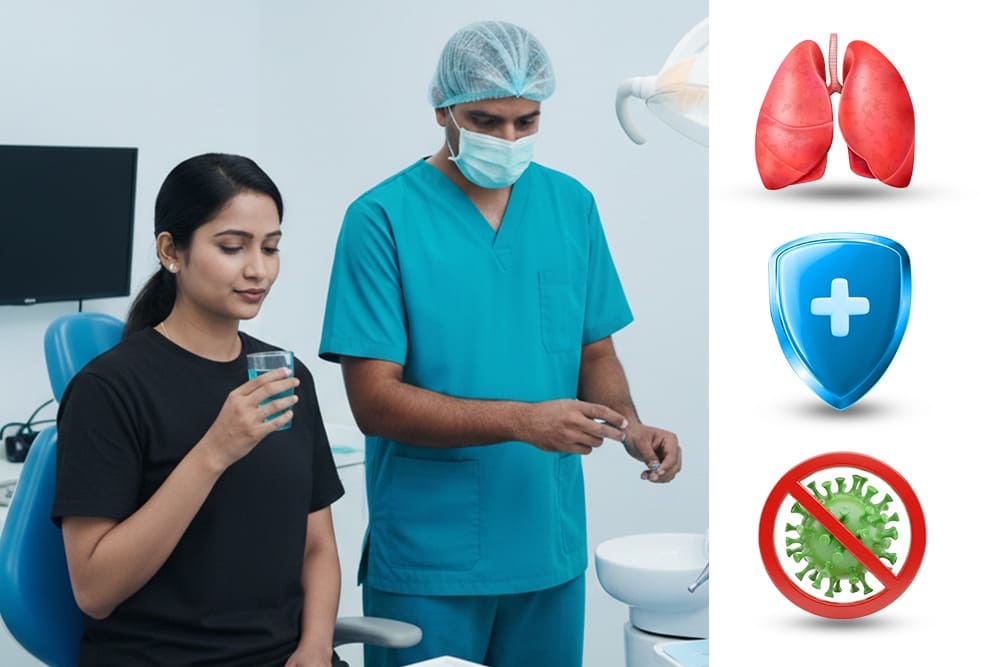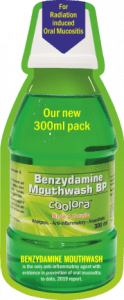Menu

Postoperative pulmonary complications (PPCs) such as pneumonia, atelectasis, and respiratory insufficiency remain common in elderly patients undergoing general anesthesia with endotracheal intubation. These complications can delay recovery, prolong hospital stay, and increase mortality.
A randomized controlled trial published in Scientific Reports (2025) by Wang et al. investigated a simple preventive approach: using chlorhexidine (CHX) mouthwash before surgery to reduce oropharyngeal bacterial colonization and potentially improve postoperative lung outcomes.
The oral cavity can serve as a major bacterial reservoir. During intubation, oral microbes may enter the lower respiratory tract, increasing the risk of lung inflammation or infection especially in elderly patients with oral frailty, a condition involving weakened oral muscles, poor dentition, and reduced salivation.
Previous studies have shown that preoperative oral care reduces postoperative pneumonia risk. For example, daily brushing before surgery lowered pneumonia rates in esophageal cancer patients from 32% to 9%. Chlorhexidine, a widely used antiseptic, has also been shown to reduce bacterial load and ventilator- associated pneumonia in intensive care settings. However, its effect in elderly surgical patients had not been fully explored.
The study enrolled 78 elderly patients (≥65 years) scheduled for elective hip replacement under general anesthesia. Participants were randomly assigned to two groups:
Patients gargled the assigned solution three times the evening before, the morning of, and immediately before surgery. The study followed a double-blind design, with both patients and investigators unaware of group assignments.
Researchers measured lung ultrasound scores (LUS) before and after surgery to assess lung aeration. They also evaluated:
On postoperative day 1 (D1), the CHX group showed significantly lower LUS compared with the saline group, indicating better lung aeration and fewer early pulmonary changes. By day 3 (D3), this difference was no longer significant, suggesting that the benefit was short-term.
Bacterial colony counts from endotracheal tube tips were significantly lower in the CHX group (P ≥ 0.007), confirming that chlorhexidine effectively decreased oropharyngeal bacterial load.
In patients identified with oral frailty, chlorhexidine mouthwash led to markedly lower LUS values on both D1 and D3, along with fewer bacterial colonies. This subgroup appeared to benefit most from the intervention. In contrast, no significant differences were observed in patients without oral frailty.
Levels of IL-1β, IL-6, and TNF-α were similar between groups, and there were no significant differences in pneumonia, fever, cough, or sputum production. No chlorhexidine-related adverse reactions were reported.
The findings highlight a close link between oral hygiene and respiratory health in surgical patients. Preoperative chlorhexidine mouthwash likely reduces micro-aspiration and early postoperative lung inflammation by lowering bacterial colonization in the oropharynx.
However, the effect was transient differences in lung ultrasound scores disappeared by the third postoperative day, possibly due to natural recovery or postoperative care measures. The authors note that continuing oral hygiene interventions after surgery may help sustain the benefit.
Although the study did not demonstrate a statistically significant reduction in pneumonia or overall PPC incidence, the improvements in early lung aeration and bacterial counts are clinically relevant. Chlorhexidine mouthwash is simple, inexpensive, and easy to incorporate into routine preoperative protocols, especially for elderly patients with compromised oral health.
Further large-scale studies should:
Preoperative chlorhexidine mouthwash improved early postoperative lung ultrasound findings and reduced bacterial colonization in elderly patients undergoing general anesthesia, with the greatest benefit seen in those with oral frailty.
While it did not significantly lower pneumonia incidence, this low-cost, non- invasive measure represents a promising adjunct to perioperative care that may contribute to better early respiratory recovery in elderly surgical patients.


| PRODUCTS | QTY | PRICE | VALUE in INR |
|---|
| PRODUCTS | QTY | PRICE | VALUE in INR |
|---|